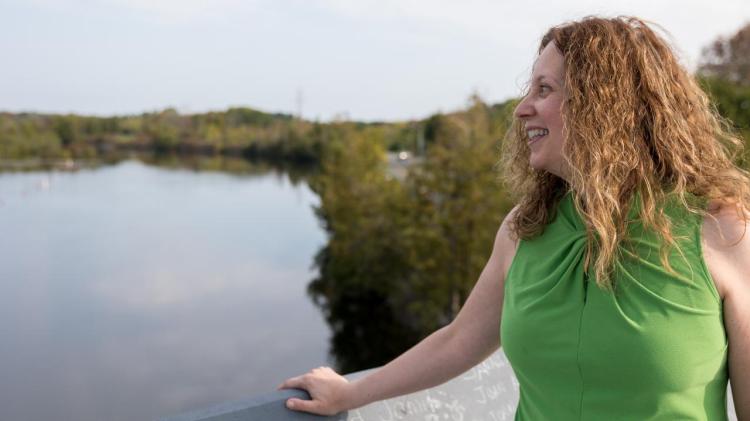
Biology professor Dr. Maggie Xenopoulos becomes first Canadian to receive award from the American Geophysical Union
Biology professor Dr. Maggie Xenopoulos becomes first Canadian to receive William Kaula Award award from the American Geophysical Union
Dr. Marguerite Xenopoulos has become the first Canadian, the second woman, and only the tenth recipient of the American Geophysical Union's (AGU) 2024 William Kaula Award. She is among less than 0.1 percent of AGU membership to be honoured with the award, which will be presented at the AGU's annual meeting in December.
"I am thrilled to be recognized for the work that I do to facilitate the communication of novel research for my community, and mentor the next generation of science editors," said Professor Xenopoulos, a Tier 1 Canada Research Chair in Global Change of Freshwater Ecosystems at Trent University. "Getting this award for doing things that I am passionate about is amazing to me."
Creating New Standards in Science Publishing
Prof. Xenopoulos is one of Canada's foremost freshwater scientists a knowledgeable voice among earth science experts at AGU. The Kaula Award recognizes Prof. Xenopoulos for her exceptional contributions to diversity, equity, inclusion, and accessibility (DEIA) at AGU Publications in her role as editor-in-chief of the Journal of Geophysical Research: Biogeosciences (JGR: Biogeosciences).
"During her term as editor, [Prof. Xenopoulos] has done more to improve the community and culture of this journal and arguably for AGU publications as a whole than any other editor I have known," wrote Dr. Ankur Desai, chair, Atmospheric and Oceanic Sciences at University of Madison-Wisconsin, in his letter of recommendation for Prof. Xenopoulos.
"[Prof. Xenopoulos] went on to significantly diversify the editorial board, develop new policies and guidance on peer reviewing to support inclusive reviewing, and lead the testing, evaluation, and communication of AGU's roll out of its Global Research Collaboration policy."
This new policy, now adopted across all 24 AGU publications, will require authors to include an "Inclusion in Global Research" statement, through which authors will disclose the ethical and scientific engagement of international partners.
"This policy is about addressing the realities of parachute science,' and is an important step toward recognizing the critical role that many researchers from resource-poor regions play in enabling science at every stage of the research lifecycle," said Prof. Xenopoulos. "We need to increase transparency and equity for researchers from resource-poor regions, including local guides and knowledge holders, who often play important roles in these investigations."
In April, AGU's inaugural Volunteer of the Month title also went to Prof. Xenopoulos for her work developing and implementing this policy, and for her work as a founding member of the AGU's DEIA Committee and her contributions to the JGR: Biogeosciences Action Plan for DEIA in Publishing.
Mentoring the Next Generation
In addition to being a leader among her colleagues and in her field, Prof. Xenopoulos is also a mentor to early-career researchers and students, and launched an initiative to include early career researchers on editorial boards.
"I want to change the world of science publications. I want to change the stereotype of the mean gate-keeping editor to one that is more kind, inclusive, supportive, while still maintaining the rigorous peer-review standards," Prof. Xenopoulos said. "It's also important that new voices in science and research are represented in discussions about journal quality and best editorial practices. We're all working towards better standards in scholarly publishing."
Through her research, Prof. Xenopoulos continues to pioneer freshwater research, including advancing our understanding of winter science and ice and the role of the Great Lakes in the carbon cycle. Soon, we'll be learning more from Prof. Xenopoulos about Lake Erie's algae blooms, Lake Superior's metabolism and release of carbon dioxide, and what our future looks like as ice cover on the Great Lakes shrinks rapidly.











